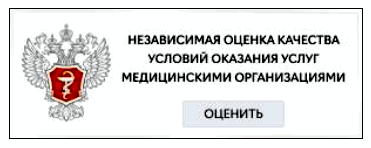Объявления
-
Памятки «Навигатор профилактики», разработанные Московским...
Уважаемые преподаватели и кураторы ФГБОУ ВО ДГМУ Минздрава России! В дополнение к ранее направленному письму от 13 октября 2022 г. № 06-14207/09-18/22 и в...
13.12.2022
2075
-
Выборы на замещение следующих должностей по срочному...
ДГМУ объявляет выборы на замещение следующих должностей по срочному трудовому договору, в связи с истечением срока избрания: список...
22.07.2024
4
-
III Всероссийская конференция «TED-Medical»
Дагестанский государственный медицинский университет приглашает членов СНО/СНК ДГМУ и других ВУЗов Российской Федерации, а также учащихся...
16.07.2024
101
-
Объявлен прием заявок на IX Всероссийский конкурс...
Открыт прием заявок на IX Всероссийский конкурс научно-исследовательских работ студентов и аспирантов Российских образовательных организаций...
08.07.2024
92
-
Осторожно, мошенники!
Уважаемые коллеги и обучающиеся! Хочу обратиться ко всем вам в связи с распространением в мессенджере Телеграмм сообщений мошеннического...
03.07.2024
94
-
Список научных и педагогических сотрудников, относящихся к...
Список ППС
02.07.2024
199
-
Как вести себя при обстреле
25.06.2024
112
-
Телефон для приема сообщений о коррупционных проявлениях:
68-32-80
-
Эл. почтовый ящик:
Ubdgmu@mail.ru
Department of Forensic Medicine
13.07.2021
207
General information
Head of the department: Dr. Biol. Sc., Professor, Ashurbekov Tazhidin Ramazanovich
Address: Lyakhova Ave., 1
Telephone: 68-02-78
E-mail: sudmed.caf.2019@mail.ru
The clinical base of the department is the Republican Office of the Chief Medical Examiner of RD Ministry of Health.
Staff:
Bezverkhnaya Lyudmila Danilovna, Senior Lecturer. She was born on 22.11.1950. She had graduated from the DSMI faculty of General Medicine in 1974, Forensic expert of the highest certification category.
Ismailov Magomed Taymaskhanovich, Candiadate of Medical Sciences, Associate Professor. He was born on 04.03.1964. He had graduated from the DSMI department of General Medicine in 1993.
Porsukov Elbrus Abdulaevich, Candiadate of Medical Sciences, Associate Professor. He was born on 08.10.1964. He graduated from the DSMI department of General Medicine in 1988, Forensic expert of the highest certification category.
Ashurbekov Rustam Tazhidinovich, Senior laboratory assistant. He was born on 20.06.1976. He had graduated from DSMU in 1996.
History of the department
Professor V. A. Rozhanevsky was sent from Baku to the Medical Institute in 1936 to give lectures on forensic medicine. N. F. Zhivoderov was appointed head of the Department of Forensic Medicine in 1937, and worked in this position until 1977. It was he who contributed to the creation of the department.
- F. Zhivoderov’s assistant was his wife M. P. Kravtsova, who organized biological, forensic-chemical and pathohistological laboratories at the department. She has been teaching at the department for 30 years. Associate professor L. T. Artamonova has been the head of the department since 1947, and from 1970 to 1999 — Professor G. G. Omarov. Professor T. R. Ashurbekov has been the head of the department from 1999 to the present.
Training
The pedagogical process setting up experience at the DSMA Department of Forensic Medicine shows that in the teaching process, the main thing is to teach students the relevant theoretical knowledge in the field of forensic medicine and practical skills necessary to perform the function of an expert doctor and to form expert thinking among students, the use of forensic medical knowledge and methods of work in general medical activities.
To fulfill this task, the lectures on forensic medicine present the basics of forensic science, its latest achievements, connections with other medical and related specialties, materials of methodological letters, dissertations, journal articles published in the leading newspapers are widely used.
At practical classes held in the department of living persons examination, in the sectional hall and laboratory units of the ROCME RD, students, within the procedural permissible limits, independently actively practice in the production of current examinations conducted on the basis of decisions of the judicial and investigative bodies of the RD. At the same time, students actually become in the position of an expert doctor (under the supervision of a responsible teacher).
Students are taught in practical classes to study corpses, physical evidence, examination of living persons and examination of documents and materials of the investigation. Assessment of the quality of preparation and assimilation of the topic is carried out by the teacher by interviewing, conducting test control, solving situational problems, describing models, wet and bone preparations, imitating wounds, forensic photos on the topic of classes, participation of students in the process of autopsy of corpses and examination of living persons, conducting examinations on medical documents. Classes are held according to the cyclic method and end with a differentiated test. The test is carried out in stages: the solution of the test control (100 questions per option), a written answer to the ticket and the solution of situational problems.
Research activities
The staff of the department has been publishing more than 50 works on various problems of theory and expert practice in central and republican printed publications during the period from 2014 to 2019.
Resources
In recent years, the staff of the department has published and introduced into the educational process 8 textbooks and 4 methodological recommendations on forensic medicine and forensic psychiatry. Standard test questions on 12 main topics of forensic medicine with test control in variants for students of medical, pediatric and preventive medicine faculties were published and introduced into the educational process.
There have also been published and introduced test questions on 8 topics into the educational process with test control for students of the Faculty of Dentistry (each version contains 50 questions).
Information stands are posted in the lobby, where orders, announcements, innovations in science and expert practice are placed, as well as visual materials about the department routine.
